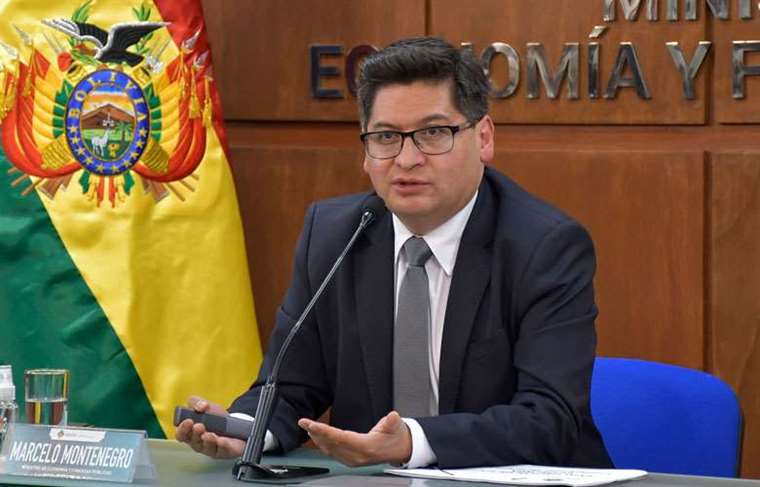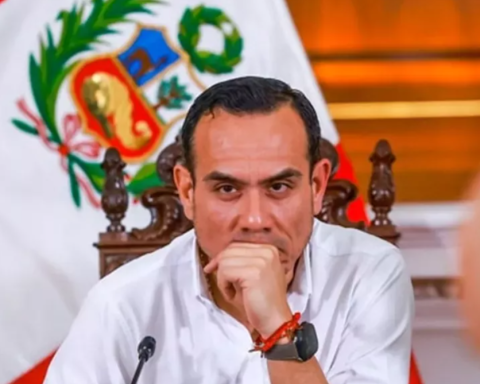August 11, 2024, 4:00 AM
August 11, 2024, 4:00 AM
The Minister of Economy and Public Finance, Marcelo Montenegro, justifies the possibility of consulting a referendum on the elimination of fuel subsidies. He says that it is a delicate issue and that is why the Government prefers to share the responsibility with Bolivians. He also talks about the exit of multinationals and how political polarization affects the economy.
The President has put forward the fuel subsidy policy for consideration by the people. Does this mean that the Government is having problems continuing to subsidize?
What happens is the following. This is a very sensitive decision that requires the full consent of the population, because as It is an element that touches the pockets may generate a reaction, even if you understand.
Or like when the doctor asks you, we have to cut off this arm if we’re not going to lose our whole body. Do you agree? I lost my mother a month ago and just to have imaging tests done on her that tragic morning, I signed 10 documents, because anything can happen at that stage.
It’s the same thing that happens now, We must go hand in hand with the people to check whether you agree to avoid more serious problems.
Otherwise, the people will understand that there will be problems, but they are aware of that. It is a shared issue, it is not a technical problem, it is such a simple issue: if it costs US$1.20 abroad and 0.50 cents in Bolivia, someone earns 0.70 cents by marginalizing. So, it will never be enough because the economy continues to grow.
Obviously, the solution involves a lot of sensitivity and important impacts and that is why people must be aware.
_Aside from the referendum, as a minister, do you think that the fuel subsidy should be eliminated? There are even sectors that are calling for it to be eliminated…
One always speaks based on one’s material base. You ask the minister, but a decision always has a political, economic and social cost. When the population had fuel subsidies for decades, removing them will always cause an imbalance and those with the lowest incomes are the ones who will suffer the most.
In Ecuador, they lifted the subsidy, but there were no expected results because it is complicated. I think that this will also bleed the country’s economy because there is no ethics in capitalism. Many people who sing the national anthem are the ones who They carry smuggled fuels, There is no civility or ethics in business. Therefore, the elimination of subsidies must be decided by the people.
_Isn’t the Government paternalistically thinking of some sectors, but making a big hole for itself that in the end leads the country to a difficult situation because it works at a loss or deficit?
Yes, there is that aspect, but it is a delicate issue and the people must understand this and that is why it is important for the people to participate in this so that a solution can be found together. It has always been a problem to lift subsidies everywhere in the world. That is why we are lifting it up for the people; it is not a simple technocratic solution and the power of the ruler to do so is within his scope of application.
It is an important decision and will affect the country’s 12 million inhabitants.
_How much of the fiscal deficit corresponds to the fuel subsidy?
3.5%.
_And in 2023, how much will our fiscal deficit be?
Well, we are going to do that at a press conference, explaining each of the components that the population needs to know about, what we have spent and why we have reached a specific number.
We had already planned this, but because of all these measures, so that it is not overshadowed, we have not disseminated it, but we will do so after the meetings we have with the different sectors of the country.
_Have shock measures been considered to reduce the fiscal deficit?
Yes. The key here is in measures with a structural and transcendental impact: increasing productivity. Paul Krugman, an economist, says that in the end everything in economics is reduced to productivity.
If you want to improve your income, your well-being, you do so by increasing productivity, because you can increase your well-being by going into debt, but that is temporary, because afterwards you have to repay the debt, and what does that mean? How can you improve your performance in repaying the debt? By increasing productivity. Everything converges to improve productivity. And that is what President Luis Arce is doing with his import substitution program, because that first of all makes for national production and that we do not spend foreign currency, that we can do it here at home and that a robust and industrial body really begins to form in the country.
_What will the repatriation of tax-free or rate-free resources consist of?
The measure we have proposed is that when someone generates profits and does not have their headquarters here in Bolivia, but abroad, there is a tax on profits abroad, which is 12.5%, that is, added to the 25% of profits here in Bolivia, plus the 12.5 it becomes 37.5; for that 12.5 if you take it all, well, you have to pay that rate, but if you reinvest, say, half, the other half that you take for having reinvested is no longer 12.5% but can be, say, 8 or 9%. So, it encourages you to reinvest within the economy and take the rest at a lower rate.
_Do you have an estimate of how much money these subsidiaries take abroad?
We have calculated more or less $300 million per year. So, if we create an incentive mechanism, at least $150 to 200 million can remain there.
_ Speaking of subsidiaries, Alicorp’s milling company has been sold, Bupa’s shares were sold to Bisa Seguros and Kimberly Clark was also sold to Empacar. And the exit of multinationals causes layoffs. Have you analysed this situation?
Each case is a particular matter, but all these multinationals never leave an economy, they always stay. The oil companies, for example, the ones that are now in Bolivia, have been there even since the Chaco War, they have never left. Alicorp is not leaving, it has only sold the milling, because it will continue to market it. And why is it selling the milling? Because the machines are older, they are less efficient. The group that bought it, which I know are seven businessmen, are going to do it better. And what it will continue to market is the sale of grain or byproducts that come from soybeans. Alicorp has not left that. Do you think anyone would leave that market of traders? Nobody.
_You talk about increasing productivity, but that requires resources. How will you attract foreign capital?
The repatriation of profits can be a dynamic aspect. If this management has reinvested 100% of the profits in the next management, your rate – as you leave more money in the economy – you will be able to take the money with you later, but at a lower rate.
It is an important incentive mechanism that we have proposed to attract capital. So that is the aspect that we want to highlight, because we believe that foreign direct investment is important.
But there is also an element there. Obviously the political aspect has to be clarified. Who is going to want to come and invest where there is political friction between various actors that affect the economy?
So, what the president has proposed regarding the referendum, which has a political aspect, must also resolve that element so that once and for all we all have clarity on the horizon and on the political scenario that also leads to an economic scenario.
No one can say that politics is going one way and the economy is going another. Of course, what we are experiencing on the economic side is the result of the political friction we have experienced since the beginning of 2023.
_The drop in hydrocarbon production has to do with paying $27 per barrel to oil companies, but we buy fuel at international prices. Can’t we pay more to companies to boost investments in the sector?
The issue of the 27 dollars is currently included in the Hydrocarbons Law. So, simply modifying the law in this aspect is probably not the most optimal or efficient option. Other parameters must be considered.
Can this be evaluated by modifying the 27 dollars? Obviously, if someone drills and instead of finding gas, finds oil, but has to sell it for 27 when the production cost, so to speak, is 40, he is not going to get a drop from you. Why? Because the law tells him that he has to sell at 27 dollars. So, if he finds gas, there would be no problem.
And the fact that Bolivia is a country with fields that have a greater quantity of gas than liquids, obviously, has perhaps allowed this aspect not to be an obstacle. But we must always consider the probability of being able to find liquids and that these are also rewarded and generate a margin. So, that is an aspect that can be considered, but it is not my responsibility, perhaps the Ministry of Hydrocarbons.
_They will meet with businessmen and social sectors to discuss the issue of exchange rate, exports and imports. Do they want social sectors to feel involved in decision-making?
Not because we want them to feel involved, but because they also have to know all the implications of the economic policy that is going to be implemented. So they are also important economic and political actors, because if there is one sector that agrees and the other is not informed, then all the decisions that may be implemented later can be misinterpreted; because from these two lines perhaps some application of some measure could come out, and if the other side does not know it, then it can be misunderstood or not understood in its true dimension.
For this, it is important that they also obviously participate in a forum with a didactic explanation of what would be intended to be done if new ideas for applying economic measures emerge.
_There is a feeling of uncertainty. What message can you give to Bolivians?
I want to tell our population that many elements of the economy have become extremely politicized.
From outside, there are interested people who probably want the government of President Luis Arce to end its actions or to do badly. And here inside, too, because several aspects have been politicized, it has obviously generated a scenario of uncertainty when Bolivia, if one can see objectively, has many natural resources and has the capacity to really reinvent itself.















